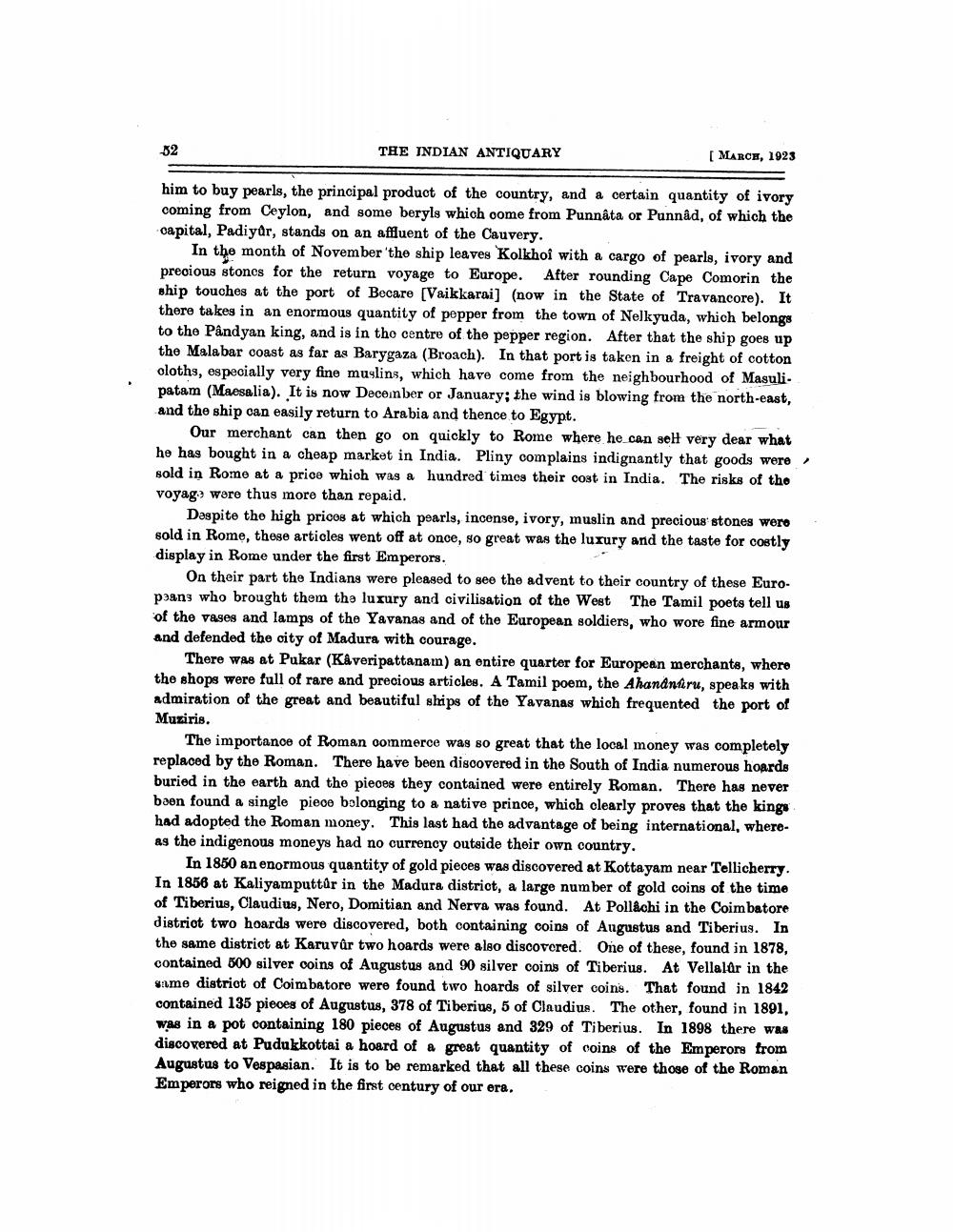________________
52
THE INDIAN ANTIQUARY
[ MARCH, 1923
him to buy pearls, the principal product of the country, and a certain quantity of ivory coming from Ceylon, and some beryls which come from Punnâta or Punnâd, of which the capital, Padiyar, stands on an affluent of the Cauvery.
In the month of November the ship leaves Kolkhof with a cargo of pearls, ivory and precious stones for the return voyage to Europe. After rounding Cape Comorin the ship touches at the port of Becare [Vaikkarai] (now in the State of Travancore). It there takes in an enormous quantity of pepper from the town of Nelkyuda, which belongs to the Pândyan king, and is in the centre of the pepper region. After that the ship goes up the Malabar coast as far as Barygaza (Broach). In that port is taken in a freight of cotton cloths, especially very fine muslins, which have come from the neighbourhood of Masulipatam (Maesalia). It is now December or January; the wind is blowing from the north-east, and the ship can easily return to Arabia and thence to Egypt.
Our merchant can then go on quickly to Rome where he can sell very dear what he has bought in a cheap market in India. Pliny complains indignantly that goods were sold in Rome at a price which was a hundred times their cost in India. The risks of the voyage were thus more than repaid.
Despite the high prices at which pearls, incense, ivory, muslin and precious stones were sold in Rome, these articles went off at once, so great was the luxury and the taste for costly display in Rome under the first Emperors.
On their part the Indians were pleased to see the advent to their country of these Europeans who brought them the luxury and civilisation of the West The Tamil poets tell us of the vases and lamps of the Yavanas and of the European soldiers, who wore fine armour and defended the city of Madura with courage.
There was at Pukar (Kaveripattanam) an entire quarter for European merchants, where the shops were full of rare and precious articles. A Tamil poem, the Ahandnaru, speaks with admiration of the great and beautiful ships of the Yavanas which frequented the port of Muziris.
The importance of Roman commerce was so great that the local money was completely replaced by the Roman. There have been discovered in the South of India numerous hoards buried in the earth and the pieces they contained were entirely Roman. There has never been found a single piece bolonging to a native prince, which clearly proves that the kings had adopted the Roman money. This last had the advantage of being international, whereas the indigenous moneys had no currency outside their own country.
In 1850 an enormous quantity of gold pieces was discovered at Kottayam near Tellicherry. In 1856 at Kaliyamputtûr in the Madura district, a large number of gold coins of the time of Tiberius, Claudius, Nero, Domitian and Nerva was found. At Pollachi in the Coimbatore district two hoards were discovered, both containing coins of Augustus and Tiberius. In the same district at Karuvûr two hoards were also discovered. One of these, found in 1878, contained 500 silver coins of Augustus and 90 silver coins of Tiberius. At Vellalar in the same district of Coimbatore were found two hoards of silver coins. That found in 1842 contained 135 pieces of Augustus, 378 of Tiberius, 5 of Claudius. The other, found in 1891, was in a pot containing 180 pieces of Augustus and 329 of Tiberius. In 1898 there was discovered at Pudukkottai a hoard of a great quantity of coins of the Emperors from Augustus to Vespasian. It is to be remarked that all these coins were those of the Roman Emperors who reigned in the first century of our era.




